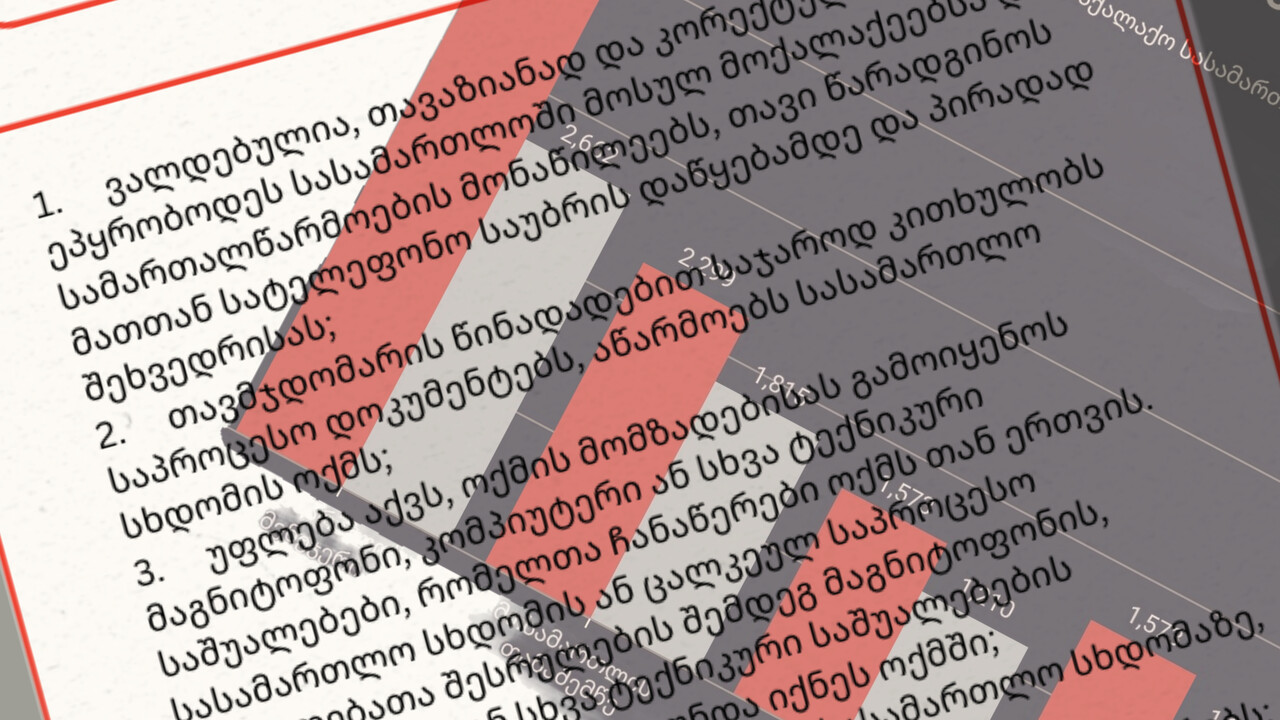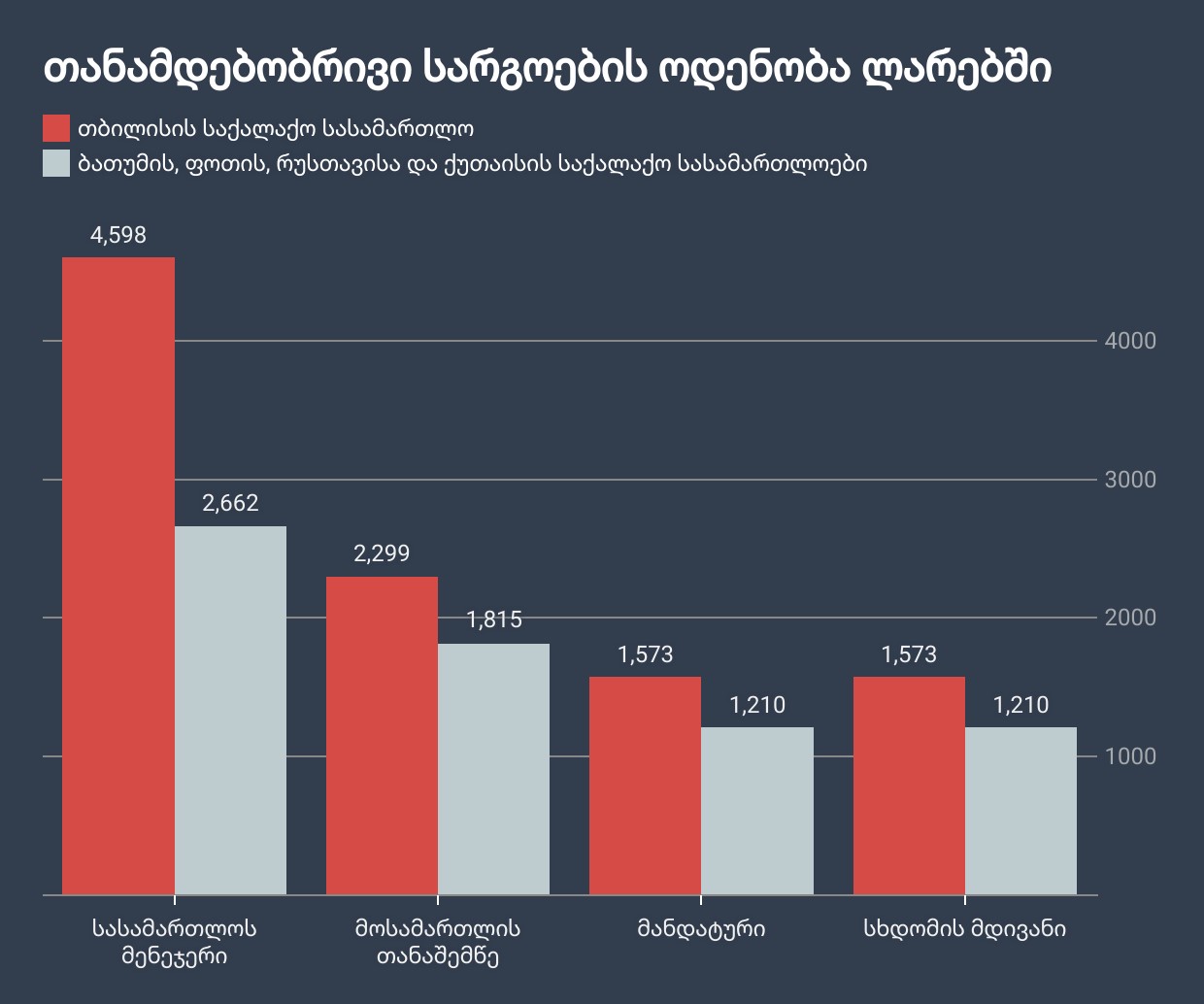Salary discrepancies of court officials.
Table of contents

Article 11 of the Constitution of Georgia guarantees the fundamental right to equality before the law. According to the Constitutional Court of Georgia, this norm is a universal constitutional norm-principle of equality, which entails ensuring equal conditions for the legal protection of persons. The degree of equality before the law is an objective criterion for evaluating democracy and human rights protection status in the country. As a result, this idea serves as both the foundation and the objective of a democratic and rule-of-law state. The norm aims to ensure equality before the law and to avoid considering substantive equal people as unequal or vice versa. Equal remuneration is crucial from the standpoint of the right to equality. From this perspective, we decided to investigate the situation with officials’ wages in the system of courts of common jurisdiction.
The structures and staff lists of Georgia's Common Courts (except the Supreme Court) are approved by the High Council of Justice, according to Article 49 of the Organic Law of Georgia “On Common Courts.”
The current order on approval of the structure of the appeal courts of the cities of Tbilisi and Kutaisi, district (city) courts, staff list, and the official salaries of employees was authorized by the High Council of Justice on January 16, 2023.
Depending on the needs, each court has a separate personnel list. We examined the positions that are common to all city courts. Only the Tbilisi City Court has a distinct official pay among Georgia's five city courts. Although the Chairpersons of the City Courts of Kutaisi, Batumi, Rustavi, and Poti are paid GEL 2662, the Manager of the Tbilisi City Court is paid GEL 1936 GEL more, or GEL 4598.
The situation is identical for court secretary, assistants to the judges, and bailiffs, which indicates that people in these positions get lower official salaries in other city courts than in Tbilisi City Court.

Indeed, the High Council of Justice sets different official salaries for people working in the Tbilisi City Court than for the staff of other courts of common jurisdiction, but the distinction does not imply discrimination. Differing treatment based on an objective assessment of factual circumstances, considering the public interest, and establishing a fair balance between the overall welfare of society and the rights of the individual shall not be considered discrimination, according to the Constitutional Court of Georgia. Varied treatment must serve a legitimate purpose, and the interrelationship between the differing treatment and the legitimate goal must be reasonable and proportionate.
The decision on differential pay (salary) must have an adequate reason and explanation. However, given that we find no such justification in the High Council of Justice decision, we can only assume what can be the rational explanation for such an approach.
The excessive workload of courts?
Tbilisi City Court is the largest and busiest court in Georgia. This fact is backed by available statistics. According to statistics available on the court's website, in 2021, the Tbilisi City Court registered 49,957 cases, while 8,083 cases were registered in Batumi City Court, and 5,361 cases were filed with Rustavi City Court in the same year. However, the court's overall caseload does not imply that each judge or individual staff member is less busy.
According to statistics posted on the courts' websites, Tbilisi City Court has 126 judges as of May 1, 2023, Batumi City Court has 12, Rustavi City Court has 12, Poti City Court has 2, and Kutaisi City Court has 5.
Thus, while it is true that the Tbilisi City Court receives the most cases to be examined each year, this general fact alone cannot explain why the assistants to a judge and court secretary working in the Tbilisi City Court are paid differently than in other city courts; additionally, it is plausible, the judge of the Rustavi City Court may annually examine more cases than the judge of the Tbilisi City Court.
Different functions?
Another plausible explanation should be explored in the employee's duties. Aren't the duties, functions, and responsibilities of Tbilisi City Court employees more diverse and demanding than those of other municipal courts?
Competitions declared by city courts for vacant posts at various periods and the functions of the court staff suggest that the obligations of people working in the same position do not differ from one court to the next.
For example, consider the post of court secretary. Although the job description differs from one court to another, it is more or less similar in content.
The tasks of the court secretary include preparing the case for consideration in the court session, preparing the court session's minutes, and so on. The tasks outlined in the Rustavi City Court job description for the position of court secretary are more precise and extensive than in the case of Tbilisi City Court.
Furthermore, the job description of Rustavi City Court includes requirements that are not contained in the competition application for Tbilisi City Court.
In the absence of an assistant to a judge, the court secretary shall undertake the functions of both the assistant to the judge and the court secretary on the order of the chairperson of the court.
Compared to Tbilisi City Court, the requirement indicated in the job description released by Rustavi City Court puts more significant duties/responsibilities on the person working there, if necessary. As a result, the likely argument tying the difference in salary amounts to the distinct definition of tasks and duties should be omitted as part of the basis for establishing separate salaries.
Court Secretary – Job description
Rustavi City Court
1. Treats citizens and participants in the court proceedings with respect and dignity and makes self-introduction before directing them in person and over the phone.
2. At the request of the chairperson of the court, conducts a public reading of litigation materials, and drafts the minutes.
3. Secretary may use a tape recorder, computer, or other technical means for drafting the minutes; the records shall be attached to the protocol. The notes of the recording shall be included in the protocol.
4. Gives explanations at the court hearing if there are comments on the minutes.
5. In chronological order, includes the following materials in the case: the reference sheet, the ruling (resolutions), the case hearing correspondence, legally verified and signed minutes, the case materials according to their admission to the court hearing, the judgment, or the decision (papers turned over to an assistant to a judge must be registered in the clerk's office and handed over to the court secretary).
6. Numbers the pages of the documents and includes a description of the case files on the reference sheet.
7. Checks the court appearances and identifies the participants in the court proceedings. In case of non-appearance of the party, identifies the reasons for failing to appear.
8. Prepares the case for a hearing. In case of hearing adjournment (informs the participant of the time and place of the hearing).
9. Daily, but no later than 09:30 of the next day, the court secretary informs the statistics specialist of the following information: the cases handed over to the clerk's office and sent to the court of appeals, statistic notes on judgments – adding Form N2.
10. Obliges to draft the minutes precisely and comprehensively within the time limits envisaged by law.
11. Following the judge’s written permission makes available for inspection and copying of the case materials for the parties of the proceedings.
12. If the trial or court hearing is not possible due to court reasons, the court secretary ensures timely notification of the parties.
13. In the performance of official duties, the court secretary shall thriftily consume state property, natural resources, energy resources, and material values.
14. In the absence of an assistant to a judge, the court secretary shall undertake the functions of both the assistant to the judge and the court secretary on the order of the chairperson of the court.
Tbilisi City Court
1. Preparing the case for court hearing/trial.
2. Informing the court hearing attendees about the time and place of the court hearing.
3. Preparing copies of the proceeding documents and handing them to the parties of the court proceedings.
4. Registration of the documents presented during the litigation in the electronic database.
5. Scheduling of court hearings.
6. Supervising the return of certified summons/subpoenas to the court and communicating to the judge the reason for the non-delivery of the summons/subpoena.
7. Entering the progress of the case hearing/trial into the form and forwarding it to the clerk's office for inclusion in the registration-statistical records.
8. Preparing the minutes.
9. Forwarding the resumed cases to the clerk’s office within the time limits envisaged by the law.
In recent years, Tbilisi City Court has set a distinct, higher official remuneration for public officers in comparison to other courts. For example, the pay of the Chairman of the Tbilisi City Court in 2020 was GEL 3,300, but it was GEL 2,000 in other city courts. As a result, the High Council of Justice's approach to labor contracts is not novel.
It is unclear what is the basis for the High Council of Justice's differing approach concerning the official salaries for identical positions.
The major issue is that the High Council of Justice does not explain, and so does not justify, the reasons for its decision. Obviously, an alternative approach, reflected in different official salaries, may have a valid rationale, but the High Council of Justice has made no attempt to present one.
---
The materials distributed by courtwatch.ge and published on the website are the property of "Georgian Court Watch", when using them, "Georgian Court Watch" should be indicated as the source.

































